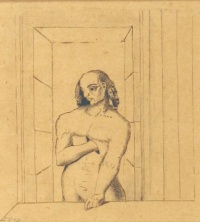Critical thinking
From The Art and Popular Culture Encyclopedia
![Diagram of the human mind, from Utriusque cosmi maioris scilicet et minoris metaphysica, page 217[1] by Robert Fludd](/images/thumb/200px-Diagram_of_the_human_mind,_from_Robert_Fludd_(1574-1637),_Utriusque_cosmic_maioris_scilicet_et_minoris_metaphysica.jpg)

"I think, therefore I am" --René Descartes
|
Related e |
|
Featured: |
Critical thinking is the objective analysis of facts to form a judgment. It is an intellectual virtue. The subject is complex, and several different definitions exist, which generally include the rational, skeptical, unbiased analysis, or evaluation of factual evidence. Critical thinking is self-directed, self-disciplined, self-monitored, and self-corrective thinking. It presupposes assent to rigorous standards of excellence and mindful command of their use. It entails effective communication and problem-solving abilities as well as a commitment to overcome native egocentrism and sociocentrism.
History
The earliest documentation of critical thinking are the teachings of Socrates recorded by Plato. Socrates established the fact that one cannot depend upon those in "authority" to have sound knowledge and insight. He demonstrated that persons may have power and high position and yet be deeply confused and irrational. He established the importance of asking deep questions that probe profoundly into thinking before we accept ideas as worthy of belief.
He established the importance of seeking evidence, closely examining reasoning and assumptions, analyzing basic concepts, and tracing out implications not only of what is said but of what is done as well. His method of questioning is now known as "Socratic Questioning" and is the best known critical thinking teaching strategy. In his mode of questioning, Socrates highlighted the need for thinking for clarity and logical consistency. Socrates asked people questions to reveal their irrational thinking or lack of reliable knowledge. Socrates demonstrated that having authority does not ensure accurate knowledge. He established the method of questioning beliefs, closely inspecting assumptions and relying on evidence and sound rationale. Plato recorded Socrates' teachings and carried on the tradition of critical thinking. Aristotle and subsequent Greek skeptics refined Socrates' teachings, using systematic thinking and asking questions to ascertain the true nature of reality beyond the way things appear from a glance.
Socrates set the agenda for the tradition of critical thinking, namely, to reflectively question common beliefs and explanations, carefully distinguishing beliefs that are reasonable and logical from those that—however appealing to our native egocentrism, however much they serve our vested interests, however comfortable or comforting they may be—lack adequate evidence or rational foundation to warrant belief.
Critical thinking was described by Richard W. Paul as a movement in two waves (1994). The "first wave" of critical thinking is often referred to as a 'critical analysis' that is clear, rational thinking involving critique. Its details vary amongst those who define it. According to Barry K. Beyer (1995), critical thinking means making clear, reasoned judgments. During the process of critical thinking, ideas should be reasoned, well thought out, and judged. The U.S. National Council for Excellence in Critical Thinking defines critical thinking as the "intellectually disciplined process of actively and skillfully conceptualizing, applying, analyzing, synthesizing, or evaluating information gathered from, or generated by, observation, experience, reflection, reasoning, or communication, as a guide to belief and action."
See also
- Age of Enlightenment
- Cognitive bias mitigation
- Critic
- Critical
- Demarcation problem
- Dialectic
- Disinformation
- Freedom of thought
- Freethought
- Outline of human intelligence – topic tree presenting the traits, capacities, models, and research fields of human intelligence
- Outline of thought – topic tree that identifies many types of thoughts, types of thinking, aspects of thought, related fields
- Philosophy education
- Sapere aude
- Thinking

